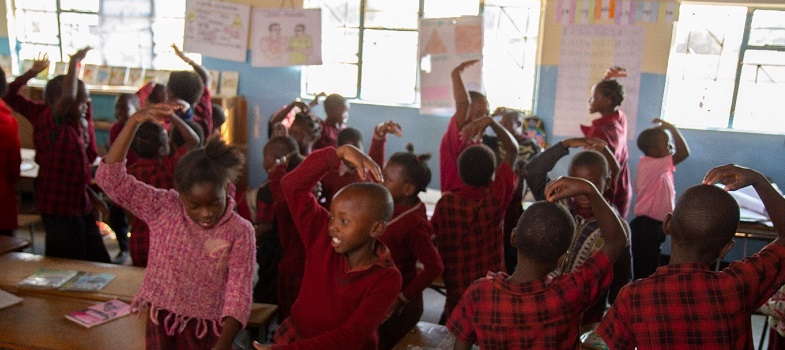Training guide
7. The Zambian Revised School Curriculum
In 2013 the Zambian Ministry of General Education published a revised school curriculum (you may also know this as the ‘syllabus’ for each subject). The new curriculum is designed to prepare children better for life in the 21st Century. As well as having knowledge of the main curriculum subjects, the Government wants children to be creative problem-solvers with a range of skills. If you are not living and working in Zambia, adapt this section for your own school curriculum. It is very likely that you are expected to help learners develop a range of different skills.
For each topic in the new curriculum, they have therefore set out the required knowledge, alongside linked skills and values. Teaching skills and values requires active approaches such as the ones that you have been practising since starting this programme.
Activity 2.15: Skills and valuesAs a group, brainstorm the skills that you would like the learners in your school to have. Appoint a scribe and write all the ideas on a flip chart or on the left-hand side of the chalkboard. When you have run out of ideas, do the same for values. Write your ideas on the right-hand side of the chalkboard or on a new flipchart. Some of the skills and values will overlap or be similar. Working in smaller groups, make a list of ten key skills and ten key values which you think children need to learn and write them in your Teacher Notebook. Choose three skills and three values. For each one, discuss how you could support the development of these skills in your classroom |
Activity 2.16: Skills and values in a science lessonWatch the video below of a Grade 7 science lesson. As you watch write down the skills and values that the children are practising in your Teacher Notebook. After you have watched the video, compare your notes with another teacher and write any additional skills or values they might have noticed. Now compare your list to the lists of ten skills and values you wrote in your Teacher Notebook. Are they the same? Are they new ones you can add to your lists? |
In the video the children had opportunity to develop their practical skills by manipulating apparatus, to work co-operatively and to listen to others. They had to respect each other, share the tasks and help each other.
They also learned how to get clean water from dirty water, and some technical scientific words (like filter, filtrate and residue). With skilful questioning, the teacher could also have helped them develop analytical and evaluative skills.
For example, this is how the teacher can get the children to think, analyse and evaluate:
|
Teacher (talking to two boys): Is the water in the pot completely clean? Joseph (looks in the pot): No, it is still a bit murky – I would not want to drink it! Teacher: Why do you think that is? Joseph: Some of the mud came through the material. Samuel: Joseph poured the dirty water in too fast, so some went over the top of the funnel. Joseph: No I didn’t. Teacher to Samuel: It is difficult to pour slowly, did you try? Like all things, this needs practise. Teacher to both boys: How could you stop the mud coming through? Joseph: Could you use different material? I noticed that in Martha’s group their water was cleaner. We had the white material and they had the red one. Teacher: Well-noticed, boys! Now try holding the two pieces of materials up to the light. What do you see? Samuel: The holes are bigger in the white material! Some of the mud came through. It is better to use the red material. |
If the teacher had just demonstrated the experiment the children would have missed the chance to develop their practical skills. The teachers’ careful questioning encouraged analysis and evaluation – thinking skills.
